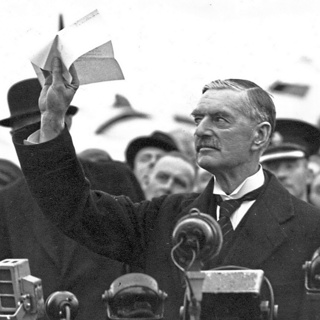Om episode
With the Austrian annexation complete, Hitler could now start eying up his next target, Czechoslovakia again. Although Italy had proved absolutely no help to Britain in trying to stop Hitler’s move against Austria, Chamberlain had given his word to put in place an agreement which would accept the Italian occupation of Abyssinia in return for some Italian commitments in the Mediterranean, over the Suez Canal, and to stop intervening in the Spanish Civil War. Chamberlain seems to have felt that he had to go ahead with this agreement and submitted it to the Commons for approval. With Conservative anti-appeasers rather muted, even Churchill, the opposition had to be led by Attlee. He was Leader of the Opposition, which was now oddly enough a paid post. He had also strengthened his position in the Labour Party, especially since two colleagues, Bevin and Dalton, had forced through a change of policy to stop opposing the government’s plans for defence spending – they felt that such expenditure was increasingly needed in the face of the growing threats from the dictatorships. Attlee also spoke out loudly in defence of the Spanish Republic, especially after a visit there in late 1937. The House of Commons approved the agreement with Italy despite the opposition to it. That in effect turned a blind eye to Italy’s breach of international law in Abyssinia. Now Hitler prepared his next breach of such law. Faced with what seemed to be an imminent Nazi invasion of Czechoslovakia, Chamberlain travelled out to see Hitler three times, on the last occasion accompanied by the French Prime Minister, Daladier, and the Italian dictator, Mussolini. The resulting Munich Agreement, which allowed Germany to absorb a huge part of Czechoslovakia, on the pretext of protecting the German-speaking minority in those areas, left the country defenceless to future attack. In the parliamentary debate on the Agreement, Churchill emerged as the champion of the anti-appeasement cause, though Attlee too spoke out powerfully against it. But there was relief across the country and in most parts of the House of Commons that peace had apparently been preserved. That left the anti-appeasers swimming against the current of public and political opinion. The peace that Chamberlain had bought would, however, not last long. Illustration: Chamberlain waving the Munich Agreement on his return to England at Heston Aerodrome. ‘Peace for our time’. Public Domain Music: Bach Partita #2c by J Bu licensed under an Attribution-NonCommercial-No Derivatives (aka Music Sharing) 3.0 International License
